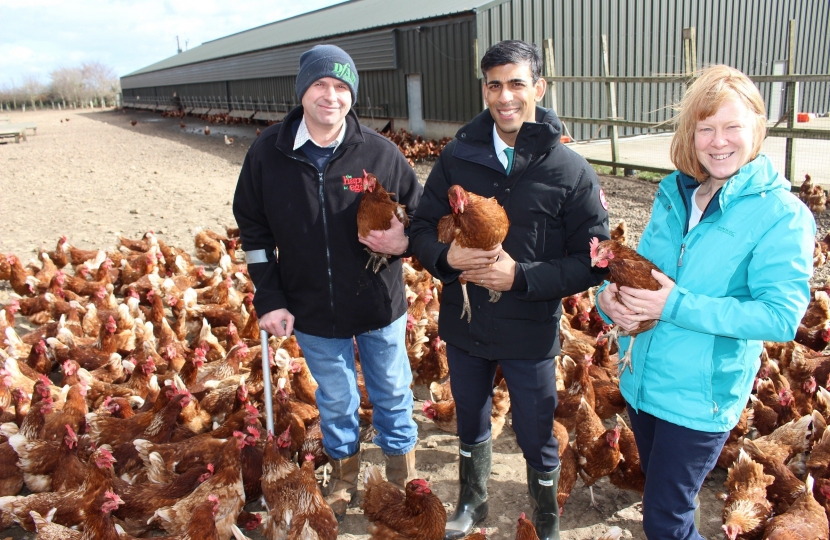
Working as your MP, I have had some wonderful, eye-opening and sometimes downright strange experiences over the years.
From being given a good soaking in the stocks at Bedale Scouts Fair, to helping out with early morning milking in a Wensleydale cow shed or joining the Swaledale Mountain Rescue Team on exercise, the business of understanding all the amazing things that people do in the constituency has thrown up some real surprises.
Most recently, I found myself bedecked in a bio-security suit standing in a ‘sea’ of 10,000 free range hens who were happily pecking at my wellies. A strange sensation indeed!
I’d called in to Nigel and Sue Smith’s Stonecote Farm at Arrathorne, near Bedale, to find out about their business which is a very successful part of a flourishing farming sector. The UK egg-laying flock continues to grow and now stands at 40 million and the majority of those hens are free range like Nigel and Sue’s. We currently consume around 200 eggs per person per year and this number is growing.
The UK is now 86 per cent self-sufficient in eggs of which our farmers produce 11 billion a year. Eggs are also a segment of farming which is not at all reliant on any direct payments from the Common Agricultural Policy.
In total, the Smiths have 16,000 hens – amazingly this is by no means a massive flock – who range freely between the roosting and laying shed and the farmland outside.
Welfare of the hens is a primary consideration for the Smith’s operation. As well as easy access to shelter and land on which to roam, the hens have ‘toys’ to play with – a variety of plastic objects in bright primary colours which clearly fascinate them.
It certainly appeared to me that these hens were very happy; creating the right environment is key to the hens’ happiness and productivity which in turn is encouraged by the Smiths being members of the Co-op Egg Producers Group established in 2016.
As members the Smiths meet the Co-op’s demanding welfare and quality standards through a rigorous auditing process and receive a premium payment for their eggs in return.
I am keen to see more producer groups like this in all sectors of the farming industry. When I did a major piece of work on the state of dairying a couple of years ago, I identified the absence of such groups as a major weakness in the sector.
Groups like the one the Smiths belong to can make a big contribution to ensuring high standards of production, the traceability the customers want and higher, more predictable returns for producers giving them the confidence to invest for the future.
Returning to the health issues that have dominated this column in recent weeks, I was pleased last week to have secured the continuation of the funding for the minor injuries services at the three Dales GP practices.
In the process of persuading the clinical commissioning group (CCG) – which buys local health services on our behalf – to continue funding the service at the more remote practices at Hawes, Aysgarth and Reeth, it was clear that the CCG’s new management did not fully understand the importance of rurality in making their original decision and that residents of the upper Dales should not be expected to travel more than 25 miles to their nearest minor injuries unit to get a significant cut or burn treated.
There was a real danger that what amounted to a small saving on paper would actually have cost the health service more money through delayed treatment or non-treatment.
It’s a point I have made to health service managers about our area repeatedly over the years. Sometimes, what makes sense on a spreadsheet simply doesn’t work on the ground. I am grateful to the CCG for responding so positively to our concerns.
